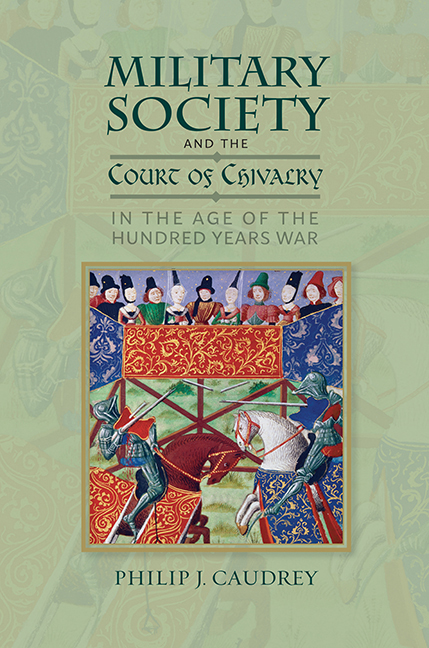Book contents
- Frontmatter
- Dedication
- Contents
- Acknowledgements
- Abbreviations
- Introduction
- 1 Military Service
- 2 Lordship
- 3 Region, Locality and Community
- 4 Soldiers, Civilians and Chivalric Memory
- Conclusion
- Appendix 1 Deponents’ Collective Military Records According to their Own Testimony
- Appendix 2 Lancastrian Retainers: Scrope & Hastings Defendants
- Appendix 3 Plaintiffs’ and Defendants’ Biographies
- Bibliography
- Index
- Warfare in History
- Frontmatter
- Dedication
- Contents
- Acknowledgements
- Abbreviations
- Introduction
- 1 Military Service
- 2 Lordship
- 3 Region, Locality and Community
- 4 Soldiers, Civilians and Chivalric Memory
- Conclusion
- Appendix 1 Deponents’ Collective Military Records According to their Own Testimony
- Appendix 2 Lancastrian Retainers: Scrope & Hastings Defendants
- Appendix 3 Plaintiffs’ and Defendants’ Biographies
- Bibliography
- Index
- Warfare in History
Summary
This book has adopted the Scrope v. Grosvenor (1385–90), Lovel v. Morley (1386–7) and Grey v. Hastings (1407–10) armorial cases before the Court of Chivalry as a means of investigating the military, social and cultural history of the late medieval English gentry. Two interrelated subjects have dominated the existing scholarship on the Court: firstly, the deponents’ patterns of military service, and secondly, evidence, through the surviving testimony, of the vibrancy of Edwardian chivalric culture. These factors have been addressed almost exclusively in a mid-to-late fourteenth-century context, emphasising the continuities in military service and martial attitudes apparent within genteel society between the 1330s and the 1370s, with minimal attention paid to the testimony centring upon the second phase of the Hundred Years War (1369–89), other than to suggest that these depositions lacked ‘the kind of resonance in recall that the great campaigns of the 1340s and 50s had had’. This book has argued that, when taken collectively, the value of the Court of Chivalry material lies in the fact that it cuts across a range of historiographical boundaries, making it possible to examine afresh a host of themes central to gentry studies, whilst simultaneously touching upon unexplored aspects of the cases themselves.
The first of these themes has been to test whether continuities of personnel and family traditions of military service – so apparent amongst Court of Chivalry witnesses between the Hundred Years War's first and second phases – were maintained into the early years of the War's third phase under Henry V. It was concluded, from an examination of the hitherto largely neglected Grosvenor and Hastings military testimony, that although the lengthy Truce of Leulinghem (1389–1415) brought the military careers of almost every single deponent to a close, their immediate descendants, to an impressive degree, upheld their family's military traditions, sometimes to the extent that as many as five consecutive generations participated regularly in the Hundred Years War between its onset in the late 1330s and the Agincourt campaign of 1415. Given these enduring military traditions, it seems highly unlikely that the depositions of younger witnesses before the Court lacked the chivalrous gloss found in the testimony of veterans of the war's first phase.
- Type
- Chapter
- Information
- Publisher: Boydell & BrewerPrint publication year: 2019

